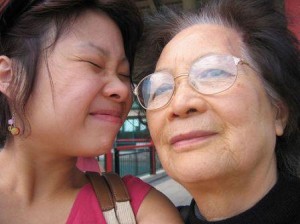[Note: I originally wrote this post, and had it posted a couple of months back, as a guest blogger on Lorie Vela’s excellent Collaboration Ideas blog. Thanks Lorie. With children shortly returning to school, and parents, and others, occupied by thoughts of “good learning”, I thought it might be timely to post it again, here.]
Small, self-organized teams, supported in an appreciative way, are an ideal model for learning. And who better than grandmothers know how to appreciate?
Small-group learning
In a fascinating experiment in child-driven education, education scientist Sugata Mitra working with children from an urban slum in New Delhi, India (and later with UK children), discovered that kids learn best:
- in teams of 4; 4 children to one computer
- in a self-organizing learning environment; an environment that stimulates curiosity can cause learning through self-instruction and peer-shared knowledge
- in conversation with each other; conversations transform us
- supported by mentors/mediators; connected to the children via broadband Internet and Skype
- with positive reinforcement; the list of mediators included volunteer grandmothers, sitting in their homes, the granny cloud.
(Watch Mitra tell the story in this 2010 TED Global presentation).
This minimally invasive education approach has parallels in the adult workplace; e.g., we know innovation happens best in a diverse, small collaborative team, what Judy Estrin suggests is teams no bigger than a jazz band. It also supports the belief that its conversations that transform us, and collaborative leaders need to find ways that enable people to have those conversations, in a safe and supportive environment.
The power of Appreciation
Of all our learning needs appreciation may matter most. Appreciation may be the most significant human psychological need. Appreciation is about being positive. We learn it early in life. As children, when we are appreciated by others, we feel good, and our behaviour reflects it. We never lose that capacity, to feel appreciated and act in positive ways.
Collaborations are strengthened through appreciative relationships. You know you’ve got it right when you find yourself in a relationship in which you are listened to, dream together, choose to contribute, act with support, and are positive.
The grandmother touch
A traditional approach to learning has been to send in so called experts to teach the people how to do new things.
Grandmothers suggest a different approach. They offer the potential of unconditional appreciation, no strings attached. Grandmothers are good at seeing the positive core of each learner. They’re observers, listeners, often just standing back admiring, encouraging, giving cookies. Learning is thinking and doing. We fail many times along the way. Grandmothers offer security, a feeling that it’s ok to fail. Next time, you’ll get it right.
Sure, grandmothers can be experts too, yet it is those other qualities (mentioned above) that are in short supply in many organizations, and which are needed most especially if you are looking to support collaborative, small-scale, self-organized, models of learning.
How do you bring the grandmother touch into your organization?
[Leave a comment about this post. Subscribe to the feed to get regular updates.]
Photo credit: Bloomsberries on Flickr
—


While not entirely on the mark – in terms of this particular posting of yours – I thought of your interest in collaboration and community, Ben, when I saw this fascinating video on sustainable, living architecture: http://www.forbiddenknowledgetv.com/videos/engineering/bridges-that-are-alive-.html. (The “uncle touch” came to mind!) It is, I believe, a wonderful example of how collaboration can benefit a community – literally building bridges between people and generations.
Brilliant… is the “living bridge” video. Highlights the potential between people & place. More challenging in our society, where uprootedness (pun acknowledged) seems to be the norm – harder to pass on knowledge to the next generation. Thanks for sharing, Susanna. A nice piece for further discussion. 🙂